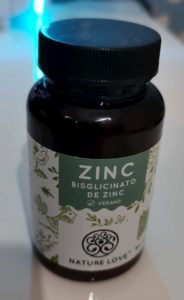What is zinc?
Zinc is a type of essential mineral (they cannot be synthesized by the body and are vital for its proper function) that is found throughout the body. This mineral is involved in DNA synthesis, healthy growth, correct wound healing, hormone production and is necessary to keep a proper function of the immune system among others.
Properties and benefits of Zinc
Zinc boosts testosterone
Research concludes that zinc acts as a hormone regulator, so it affects sexual health, reproduction and the production of hormones such as testosterone and dehydrotestosterone (DHT).
Having low levels of zinc can have a negative effect on testosterone production.
Taking 3 mg/kg of zinc during 4 weeks could increase testosterone in both sedentary people and people who play sports (Study and study).
Zinc deals with acne
Research says that people with acne usually have low blood zinc levels, so zinc levels present in the body could be related to acne severity (although low zinc levels don’t produce acne, it could acne aggravate if you have it).
In a study conclusion it is stated that zinc could reduce inflammation, act as an antioxidant and reduce levels of skin sebum production.
Zinc may reduce blood sugar
According to a 2012 study , zinc supplementation in patients with diabetes has shown to have positive effects on glycemic control.
In addition, another 2010 study concluded that zinc could also reduce insulin resistance.
It helps with growth
According to a study whose patients took zinc for 6-7 months, people who have zinc deficiency could benefit from it if they take the supplement during development, that could mean gaining more height and weight.
It’s not the only study that proves it, since a compilation of studies also concludes that it helps increasing height and weight, especially after 12 months of supplementation (In that specific case 40mg was used daily).
People who are not zinc deficient would not benefit, since zinc is essential for growth.
Zinc reduces depression and improves mood
Several studies claim that zinc could be related to psychological functions.
One study confirmed that zinc improves depression and anger or hostility at least in women taking 7 mg of zinc during 10 weeks.
In addition, research suggests that zinc deficiency is common in those who suffer from psychiatric problems such as depression.
Zinc dosage and when to take it
The recommended daily amount of zinc in Spain is 10mg , while other countries such as the United States reach 15mg for adults. However, the amount you need may vary depending on the person’s age, gender and other factors.
Zinc supplements are better absorbed if they are taken on an empty stomach or 1 to 2 hours before meal , however, some people may get nausea and if that is your case it should be taken with food.
Side effects of zinc supplements
Zinc is generally safe, although some people who take large doses or people with some sensitivity may have some of the following side effects:
- Taking large amounts of zinc for a long time can cause copper deficiency.
- Taking too much zinc can cause poisoning.
- Taking zinc on an empty stomach may cause nausea in some people.
How many types of zinc supplements exist and which zinc form is better absorbed?

Zinc is not easily absorbed, but its absorption is increased when it is chelated (a type of process by which it is attached to another substance that is better absorbed) so if a supplement has more zinc quantity, it does not mean that it would be completely absorbed.
I have prepared a table with the most common zinc types and their conversion level to elemental zinc, remember that even if it has more elemental zinc, it does not mean that you are going to absorb more zinc:
| Zinc form | Percentage converted to elemental zinc | Example |
| Zinc sulfate | 23% zinc | 110 mg = 25 mg of elemental zinc |
| Zinc acetate | 30% zinc | 25 mg = 7.5 mg elemental zinc |
| Zinc gluconate | 14.3% zinc | 50 mg = 7 mg of elemental zinc |
| Zinc oxide | 80% zinc | 50 mg = 40 mg of elemental zinc |
| Zinc citrate | 34% zinc | 50mg = 17 mg of elemental zinc |
| Zinc picolinate | ? | ? |
Zinc supplements are better absorbed when consumed on an empty stomach or separated from other minerals. This is because some minerals such as calcium, iron and magnesium can decrease its absorption.
Take into account that before taking high zinc quantities you should speak with your doctor.
Zinc FAQ
What zinc type is better absorbed?
Zinc picolinate is the type of zinc with the highest bioavailability.
Is it necessary to take copper with zinc?
It depends on how long you are taking zinc and its dosage, with small doses it will not be necessary despite of the time if you follow a correct and balanced diet, if you take higher doses than the recommended daily amount for a long time, it would be better to take copper in low doses at a different time than the one you took zinc to balance it.
